Chickpeas Vs Garbanzo Beans: 5 Proven Health Benefits
Get the scoop on the differences between the two popular beans and why they're so popular.
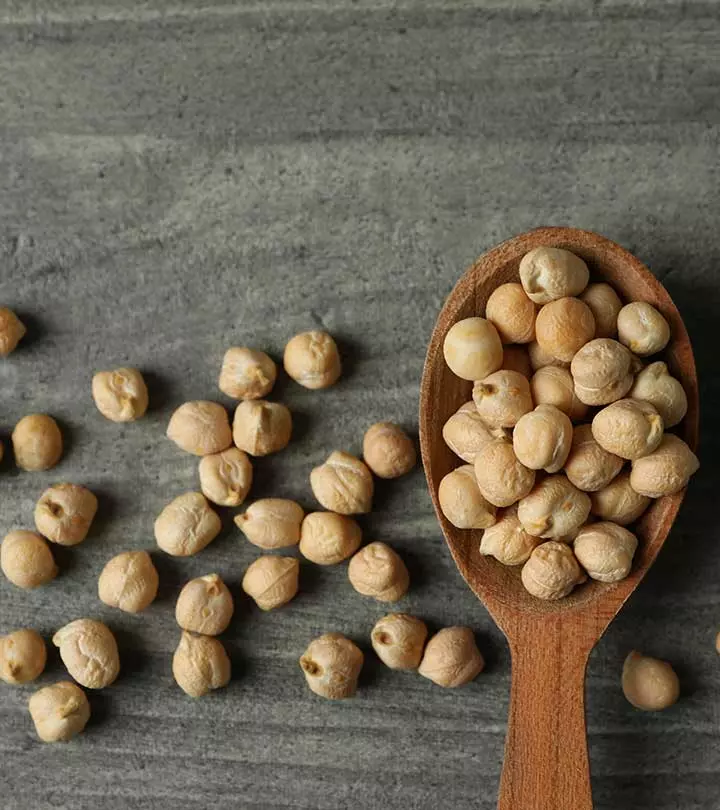
Image: Shutterstock
The garbanzo vs. chickpeas debate is age-old. You might have seen the ingredients section of your favorite chickpea recipe call for garbanzo beans instead of chickpeas. But, are garbanzo beans and chickpeas the same? if not please, what are the differences between the two? If you want to try some recipes with one of these beans, give this article a read. It explores the potential health benefits of garbanzo beans/chickpeas, ways to include them in your diet, and some easy and delicious recipes to try at home. Keep reading!

In This Article
The Difference Between Chickpeas And Garbanzo Beans
The question of chickpeas vs garbanzo can be easily settled. The difference between the two is only in their names. So, are chickpeas and garbanzo beans the same? Yes, they are. Chickpeas or garbanzo beans are the edible seeds (legumes) belonging to the Fabaceae plant family. The Latin name for these legumes, Cicer arietinum, is responsible for the origin of the word “chickpeas”. On the other hand, the name garbanzo beans come from the Basque word garbanzo, meaning “dry seed”.
Moving on, let’s check out garbanzo beans slash chickpeas benefits below. Learn why you should add them to your diet!
Key Takeaways
- There is no difference between garbanzo beans and chickpeas, as both terms refer to the same nutty legume.
- Chickpeas are rich in protein, fiber, vitamins, and minerals, which contribute to their health benefits.
- Chickpeas are believed to reduce blood sugar levels, regulate weight, and promote gut health, among other health benefits.
- You can make hummus with chickpeas or add them to salads, curries, and sandwiches.
Health Benefits of Chickpeas A.k.a. Garbanzo Beans
These nutty legumes are power-packed with nutrients, most notably, proteins (1). So if you are looking for a great plant-based alternative to hit your macros, look no further than the humble chickpea. With these, you can meet your nutrition goals and gain a few health benefits at the same time.
- Weight Control
Garbanzo beans are a low glycemic food that is nutrient-dense and low in calories. The fibers and proteins in this legume can keep you feeling full and satisfied (2),(3). A study looking at chickpeas and hunger control concluded that the quality of starch and fibers in it leads to better hunger suppression, which may lead to better weight management (4). Additionally, a review of scientific evidence evaluated the effect of changes in diet for weight management and obesity control. It suggested that high protein intake coupled with foods with a low glycemic index can play an important role in meeting your body weight goals (5).
- Glucose And Insulin Response
Chickpeas have a low glycemic index (the marker for how quickly a food raises your blood sugar levels). According to research, diets that include low glycemic index foods can help in blood sugar and diabetes management (6). The dietary fibers in chickpeas also slow down the absorption of carbohydrates during meals and help to avoid sudden spikes in blood sugar. The protein content in these legumes also plays a role in blood sugar regulation (7). In a study conducted to check the effect of eating dried beans on blood sugar levels, it was found that the rise in blood glucose levels was 45 percent lower in volunteers who had beans versus those who didn’t (8).
- Gut Health
Chickpeas are loaded with dietary fiber, which is linked with good gut health. Researchers conducted a clinical controlled trial to find if chickpeas can influence the microbes in the intestines. They found that those who took a diet fortified with chickpeas had more good bacteria and less bad bacteria in their intestinal tract. They concluded that chickpeas have the potential to promote good intestinal health by modulating the microbe population favorably (9).
- Cardiovascular Disease
The dietary fibers in chickpeas may also help to reduce the levels of LDL (low-density lipoprotein) cholesterol in your blood. This is good news for your heart as elevated levels of LDL can increase the risk of a heart attack (10). Research shows that those who consume beans regularly have higher dietary fiber, potassium, and magnesium intake which contributes to lower blood pressure levels (11).
- Cancer
A research article suggests that chickpeas may prevent your risk of developing certain kinds of cancer (2). Chickpeas contain saponins (a plant compound) that play an important role in inhibiting the growth of tumors in the body (12), (1). Chickpeas may also help your body produce more butyrate, a fatty acid known for its potential to lower the risk of colon cancer by reducing inflammation(13). In an animal study, researchers saw that regular consumption of chickpeas inhibited the growth of colon cancer (14). However, more human studies need to be conducted to verify the claim sufficiently.
Now that you know how healthy and beneficial garbanzo beans (or chickpeas, if you please) are, let’s see how you can make them a part of your diet.
How To Add Chickpeas And Garbanzo Beans To Your Diet
Chickpeas or garbanzo beans add texture, flavor, and bulk to any dish. There are a number of ways to enjoy them.
- Make hummus with chickpeas and olive oil.
- Add boiled or canned chickpeas to stir-fried greens to make a meal.
- Make a spicy vegetarian curry with chickpeas.
- Add chickpeas to soups to turn it into a meal.
- Roast chickpeas and have them as a healthy snack.
- Make sandwiches or taco filling using chickpeas.
- Mix canned or boiled chickpeas with salads.
While chickpeas are versatile and can be consumed in a variety of ways, there are certain dishes where it truly stands out. Let’s take a look at one such recipe.
Popular Recipes Using Garbanzo Beans Or Chickpeas
The hummus is a classic way to get the best out of chickpeas, but there is one more dish that comes a close second. It is the chickpea stew.
Chickpea Stew Recipe
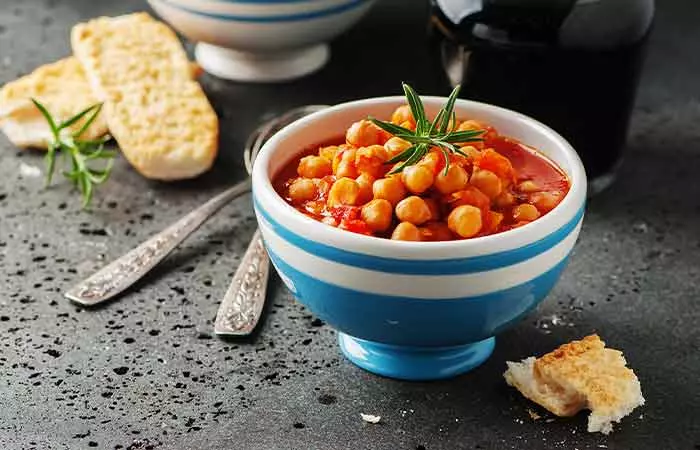
You can make this vegan-friendly, gluten-free savory stew with pantry staples in a jiffy.
Preparation Time
5 minutes
Cooking Time
35 minutes
Ingredients
- 1 can of chickpeas
- 1 tablespoon cooking oil
- 2 medium-sized onions
- 3 cloves of garlic
- 2 cups of water or vegetable broth
- 1 bell pepper (optional)
- 1 large tomato or ½ cup tomato puree
- 2 teaspoons of Italian seasoning
- ½ cup chopped parsley for garnish
- salt and pepper as per taste
Process
- Put a large saucepan over medium-high heat and pour the cooking oil.
- Add chopped onions and cook until soft and translucent.
- Add chopped garlic and stir for 30 seconds.
- Add the chopped bell pepper (if used), chopped or pureed tomato, and chickpeas along with the Italian seasoning, salt, and pepper, and stir for 5 minutes.
- Pour water or vegetable broth and cover with a lid till it comes to a boil.
- Reduce the heat to a simmer and cook for 30 minutes or until the stew thickens. You can mash some of the chickpeas with a fork to make the soup a little thicker after 30 minutes.
- Check for seasoning and adjust.
 Quick Tip
Quick Tip- Sprinkle chopped parsley and enjoy your hearty meal.
Vegan Crispy Roasted Chickpeas
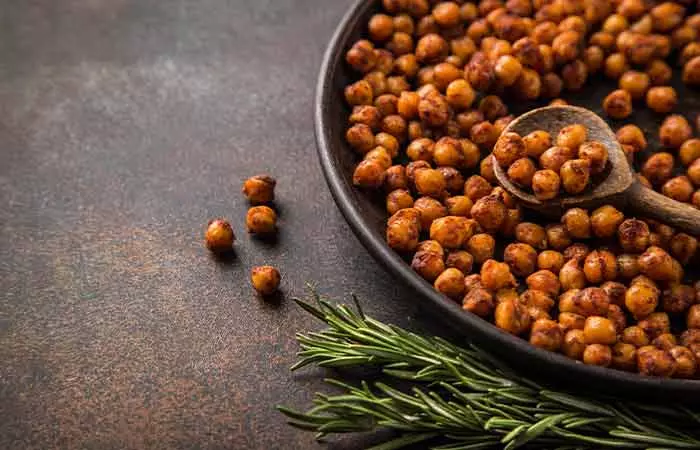
This is a simple and easy recipe for a high-protein snack with chickpeas roasted to perfection. You can also throw these chickpeas into salads for texture and protein if you wish.
Preparation Time
5 minutes
Cooking Time
30 minutes in the oven
Ingredients
- 1 can of chickpeas or parboiled chickpeas
- 1 tablespoon of extra-virgin olive oil
- salt per taste
- preferred spice for sprinkling (optional)
Process
- Preheat oven to 425 ℉.
- Rinse chickpeas after draining them if using canned or skip to step 3.
- Thoroughly pat dry the chickpeas using a paper/kitchen towel so that they are not damp. In case there are any loose skins, discard them.
- Line a baking tray with parchment paper and transfer the chickpeas onto it.
- Toss with olive oil and generous amounts of salt.
- Spread the chickpeas so that they are in a single layer.
- Transfer the tray into the preheated oven and bake for 20-30 minutes, or until crisp.
 Did You Know?
Did You Know?- Take the warm chickpeas out of the oven and toss them lightly with your spice of choice or enjoy as is!
Chickpea Tacos
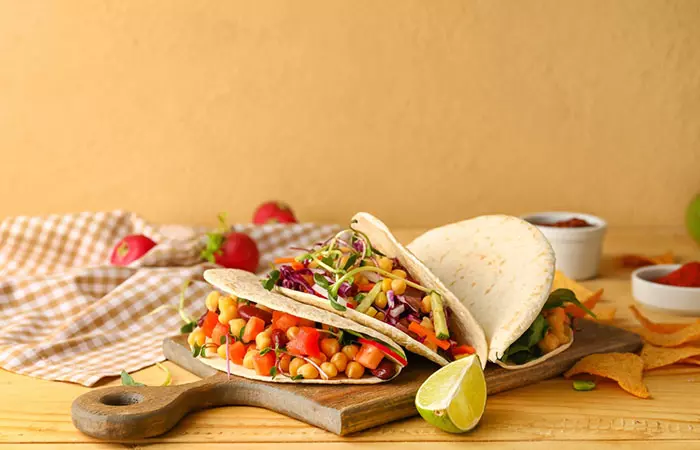
A plant-based delight, chickpea tacos are a flavorful twist on traditional tacos. Crispy spiced chickpeas meet creamy avocado, vibrant salsa, and crunchy red cabbage—all nestled in warm corn tortillas.
Preparation Time: 10 minutes
Cooking Time: 10 minutes
Ingredients
- 1 can (15 oz) of chickpeas, drained and rinsed
- 2 tablespoons of olive oil
- 2 tablespoons of taco seasoning
- 1 tablespoon of lime juice
- 8 corn tortillas
- 1 avocado, sliced
- ½ cup of salsa
- 1 cup of red cabbage, shredded
- Cilantro, for garnish
- Salt and pepper, to taste
Process
- Heat olive oil, sauté chickpeas with taco seasoning until crispy.
- Drizzle lime juice, stir, and set aside.
- Warm tortillas; assemble with chickpeas, avocado, salsa, cabbage, and cilantro.
- Season with salt and pepper.
- Serve warm.
Infographic: All About Chickpeas
Chickpeas are popular legumes with a rich nutritional profile and can help address many health concerns. Check out the infographic below to learn more about chickpeas, their nutritional value, and some of the major health benefits they offer.
![all about chickpeas [infographic]](https://cdn2.stylecraze.com/wp-content/uploads/2021/11/All-About-Chickpeas-scaled.jpg.webp)
While the debate on garbanzo beans vs. chickpeas has been around for a while, it is important to note that both mean the same. Chickpeas or garbanzo beans are delicious legumes with a nutty flavor. They contain many vitamins and minerals that help treat many benefits. The intake of chickpeas may control weight, help in diabetes management, improve gut health, reduce the risk of cardiovascular disease, and act against cancer cells. Hence, you can consume this functional food in moderation to enjoy its maximum benefits.
Frequently Asked Questions
Are garbanzo beans keto?
No, garbanzo beans are not keto-friendly. They have a decent amount of carbohydrates in them, which makes these beans unsuitable for the keto diet.
Are garbanzo beans a superfood?
Yes, garbanzo beans can be considered a superfood. They are loaded with folate, protein, fiber, and minerals that help promote your overall health if included as a part of your diet.
This informative video will provide more information about the health benefits of chickpeas and its disease-fighting properties. Explore extra information about chick peas and why you must include them in your diet.
References
Articles on StyleCraze are backed by verified information from peer-reviewed and academic research papers, reputed organizations, research institutions, and medical associations to ensure accuracy and relevance. Read our editorial policy to learn more.
- Nutritional Quality and Health Benefits of Chickpea (Cicer Arietinum L.): A Review
https://pubmed.ncbi.nlm.nih.gov/22916806/ - The Nutritional Value and Health Benefits of Chickpeas and Hummus
https://www.ncbi.nlm.nih.gov/labs/pmc/articles/PMC5188421/ - Optimising Foods for Satiety
https://www.sciencedirect.com/science/article/pii/S0924224414002386 - Chickpeas Suppress Postprandial Blood Glucose Concentration and Appetite and Reduce Energy Intake at the Next Meal
https://www.ncbi.nlm.nih.gov/pmc/articles/PMC5336455/ - Obesity and the Metabolic Syndrome: Role of Different Dietary Macronutrient Distribution Patterns and Specific Nutritional Components on Weight Loss and Maintenance
https://pubmed.ncbi.nlm.nih.gov/20416018/ - Low–Glycemic Index Diets in the Management of Diabetes
https://care.diabetesjournals.org/content/26/8/2261 - An Increase in Dietary Protein Improves the Blood Glucose Response in Persons with Type 2 Diabetes
https://academic.oup.com/ajcn/article/78/4/734/4690022 - Exceptionally Low Blood Glucose Response to Dried Beans: Comparison with Other Carbohydrate Foods
https://pubmed.ncbi.nlm.nih.gov/7427377/ - Diets Supplemented with Chickpea or Its Main Oligosaccharide Component Raffinose Modify Faecal Microbial Composition in Healthy Adults
https://pubmed.ncbi.nlm.nih.gov/21831757/ - Dietary Fiber Atherosclerosis and Cardiovascular Disease
https://www.ncbi.nlm.nih.gov/pmc/articles/PMC6566984/ - Bean Consumption is Associated With Greater Nutrient Intake Reduced Systolic Blood Pressure Lower Body Weight and a Smaller Waist Circumference in Adults: Results from the National Health and Nutrition Examination Survey 1999-2002
https://pubmed.ncbi.nlm.nih.gov/18845707/ - Saponins in Pulses and Their Health Promoting Activities: A Review
https://www.researchgate.net/publication/316508480_Saponins_in_pulses_and_their_health_promoting_activities_A_review - Dietary Fibre and Colorectal Cancer: A Model for Environment–Gene Interactions
https://pubmed.ncbi.nlm.nih.gov/15864783/ - Cooked Chickpea Consumption Inhibits Colon Carcinogenesis in Mice Induced with Azoxymethane and Dextran Sulfate Sodium
https://www.tandfonline.com/doi/abs/10.1080/07315724.2017.1297744 - Diet in Irritable Bowel Syndrome: What to Recommend Not What to Forbid to Patients!
https://www.ncbi.nlm.nih.gov/labs/pmc/articles/PMC5467063/
Read full bio of Dr. Pallavi Srivastava
Read full bio of Varsha Patnaik
Read full bio of Ravi Teja Tadimalla
Read full bio of Sindhu Koganti







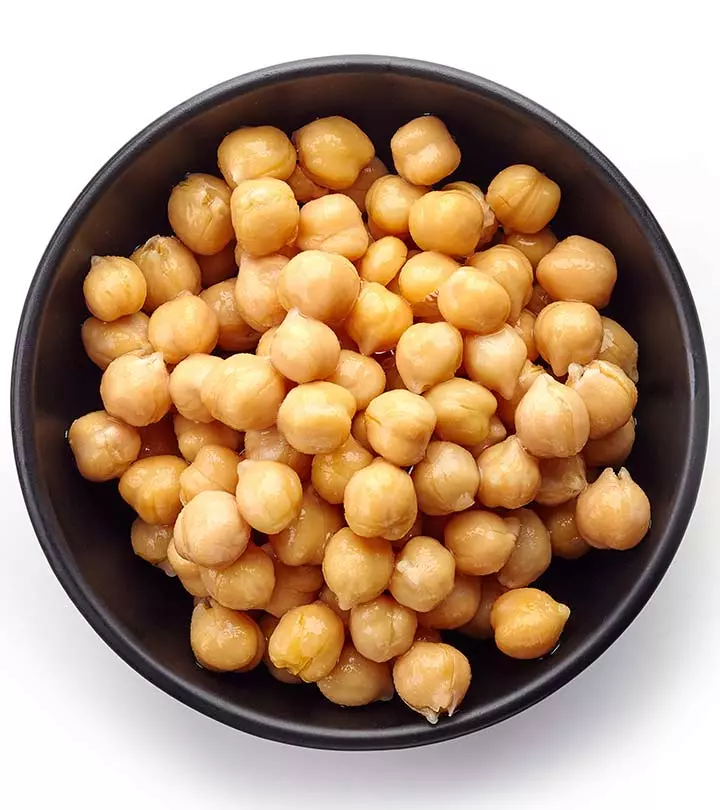
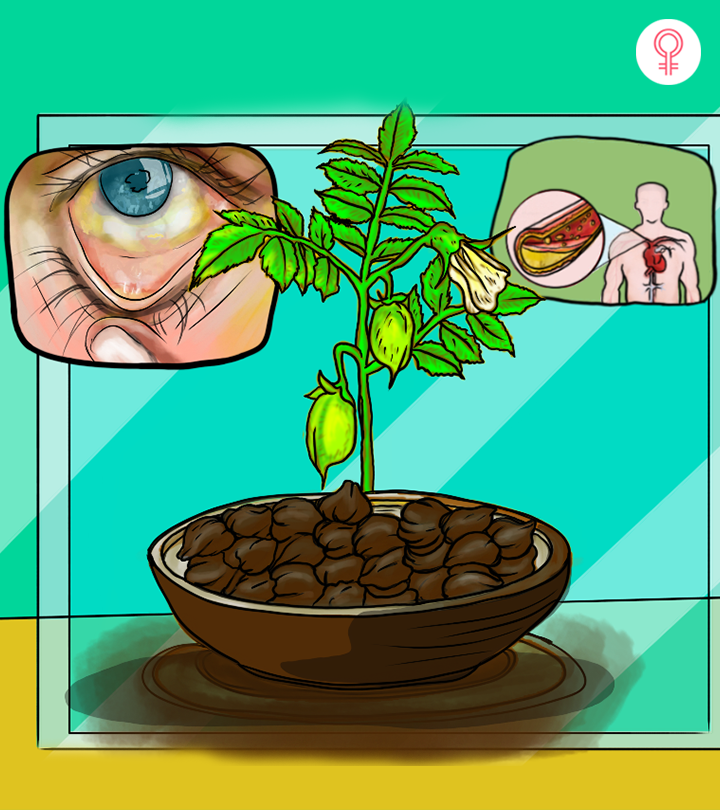
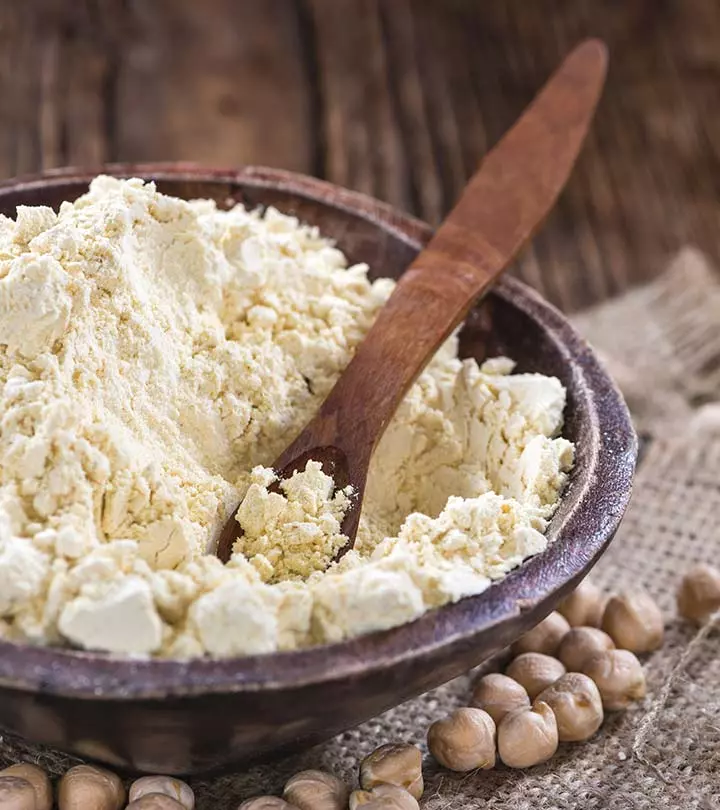
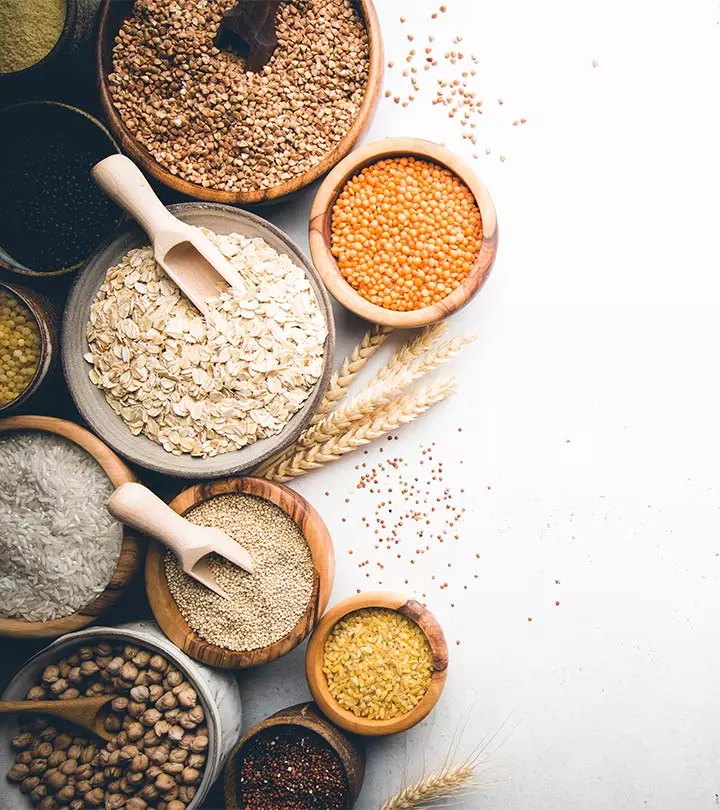
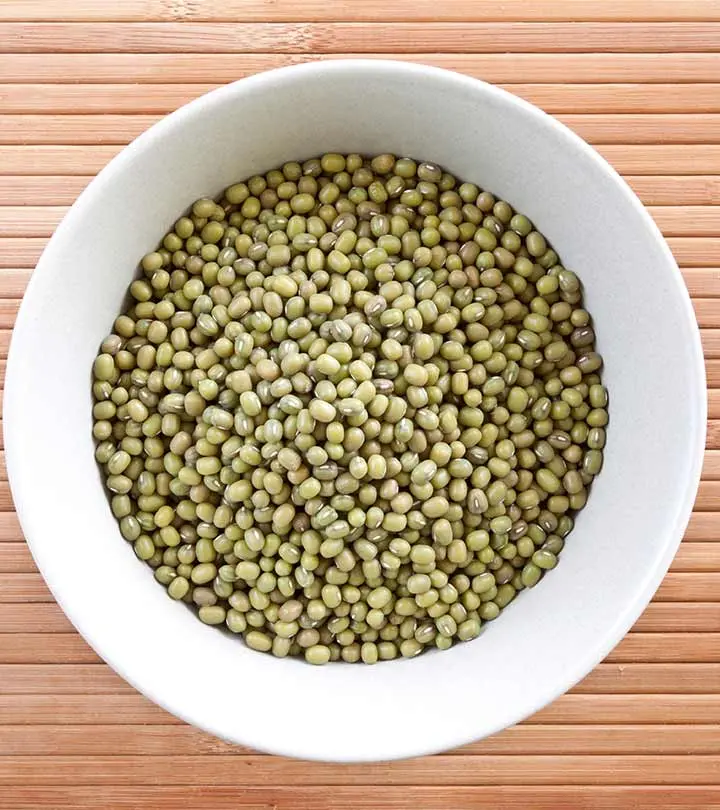
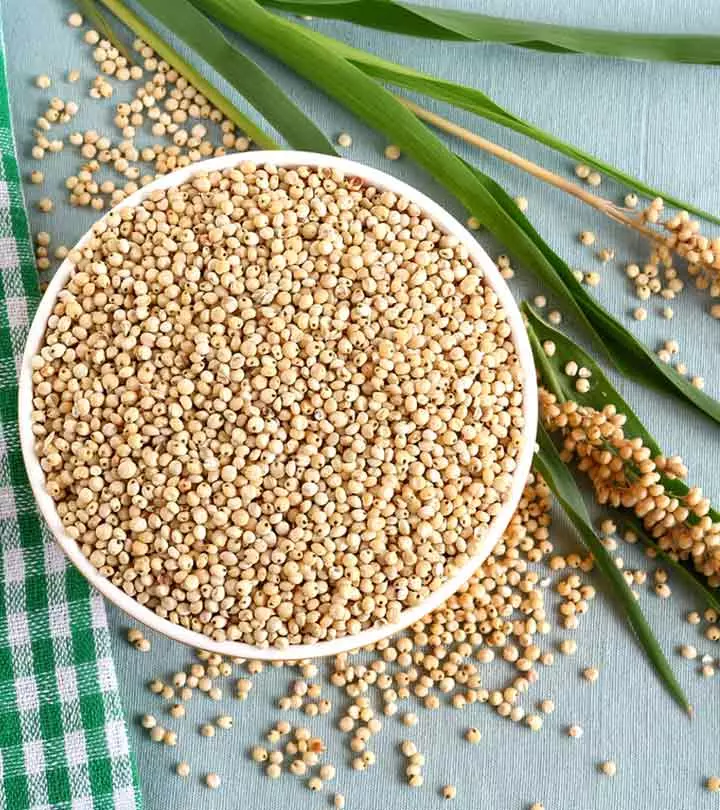
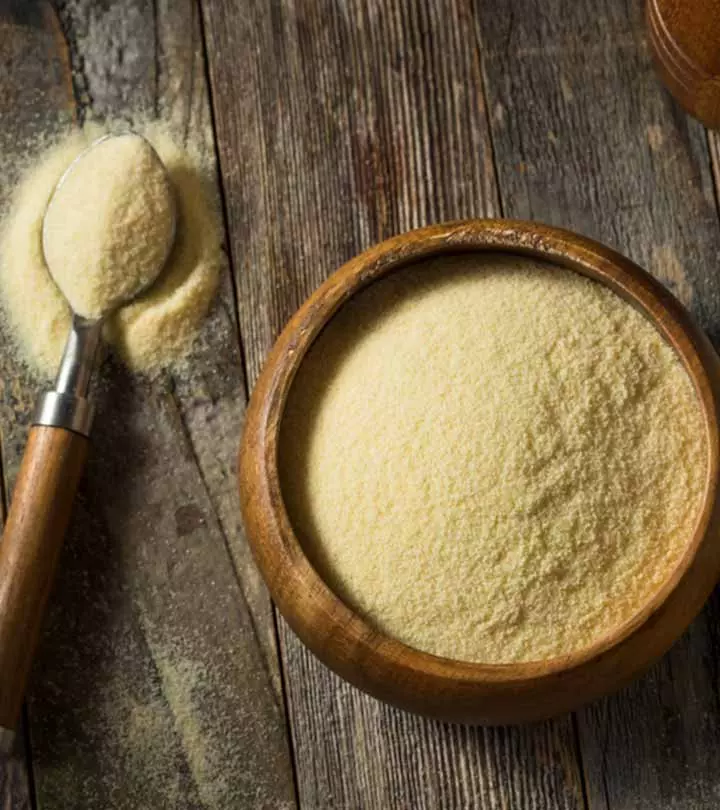
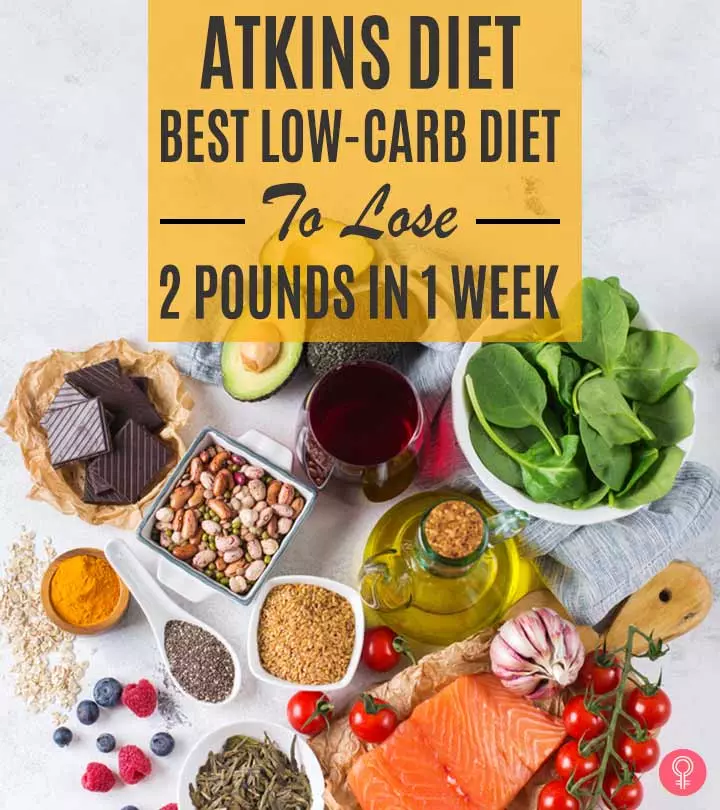
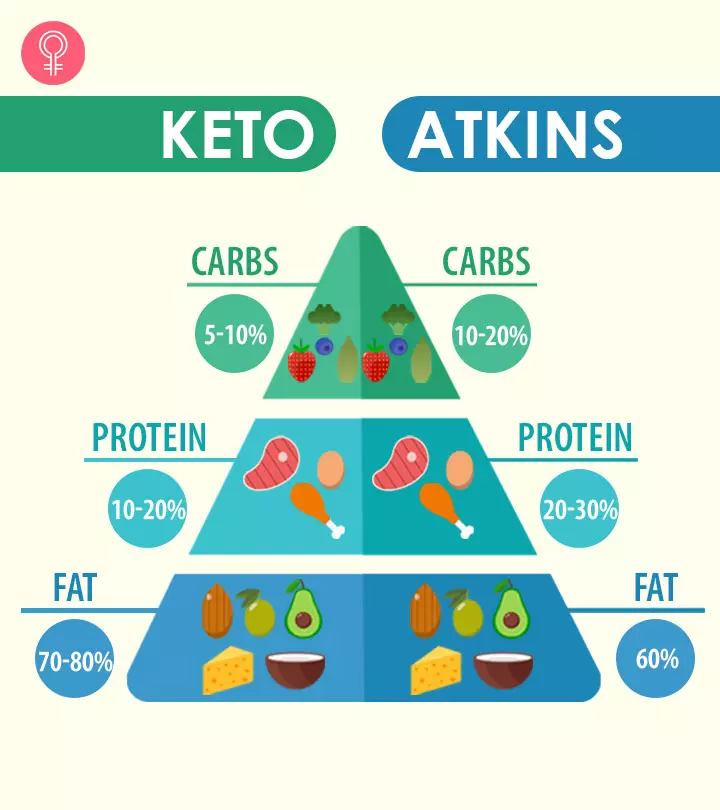
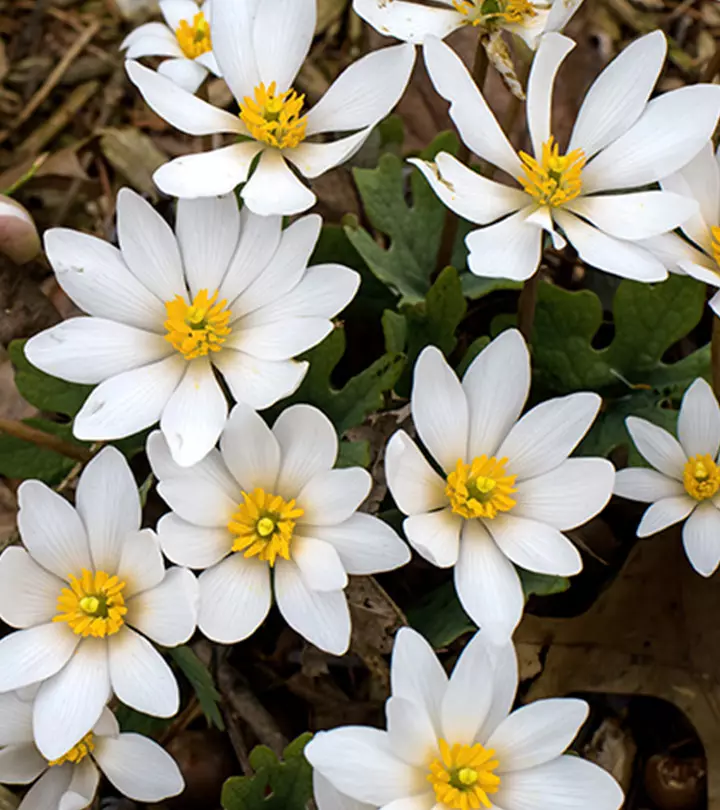
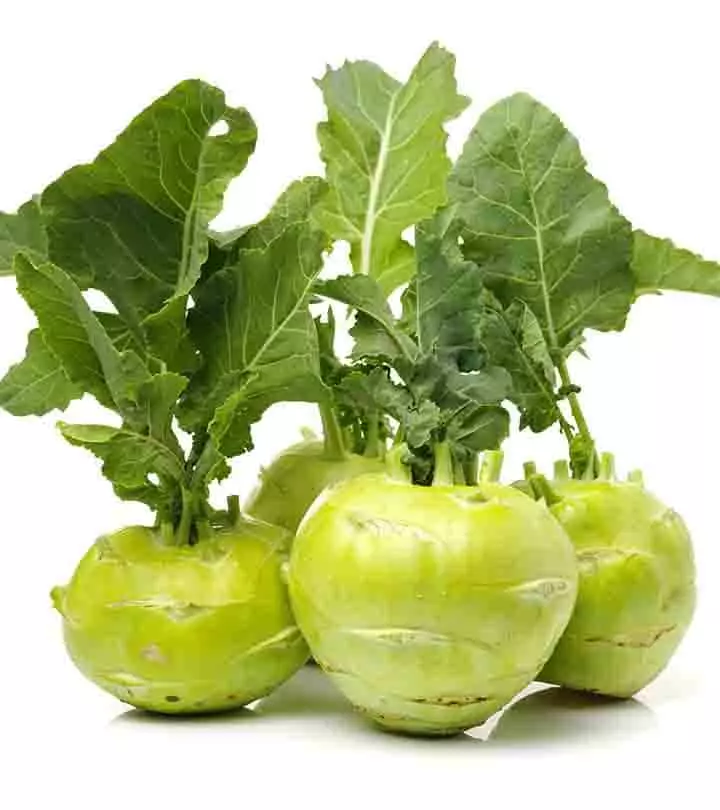

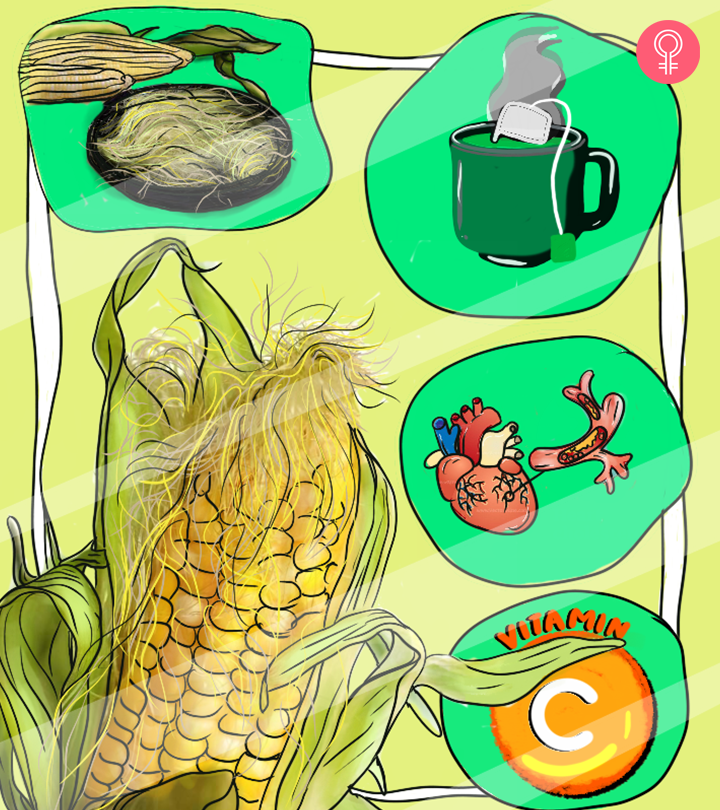
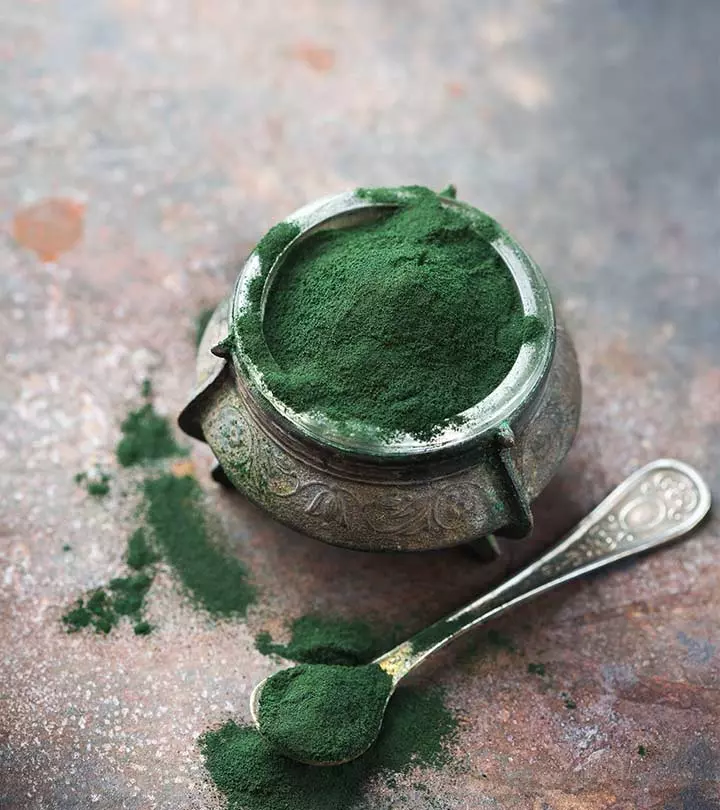
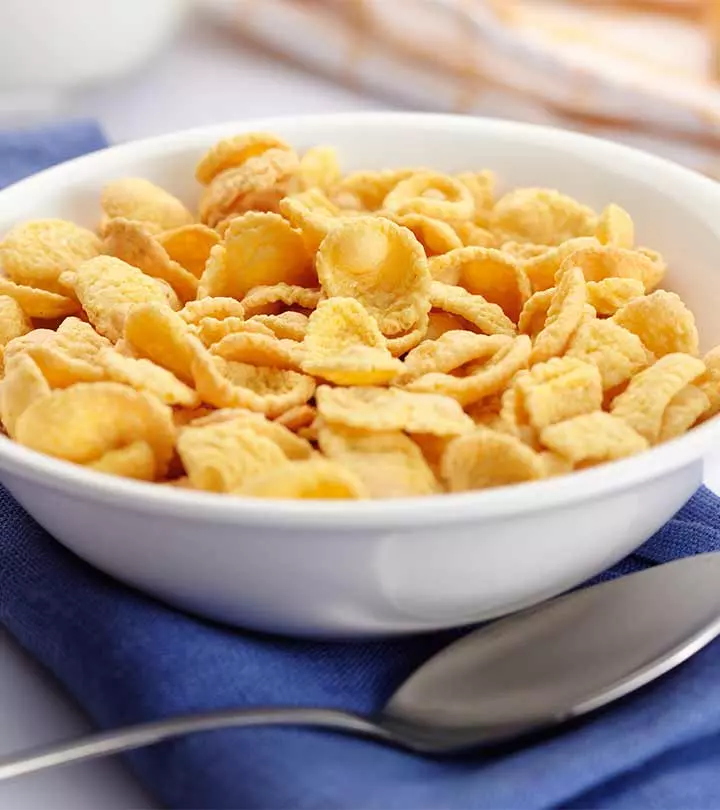

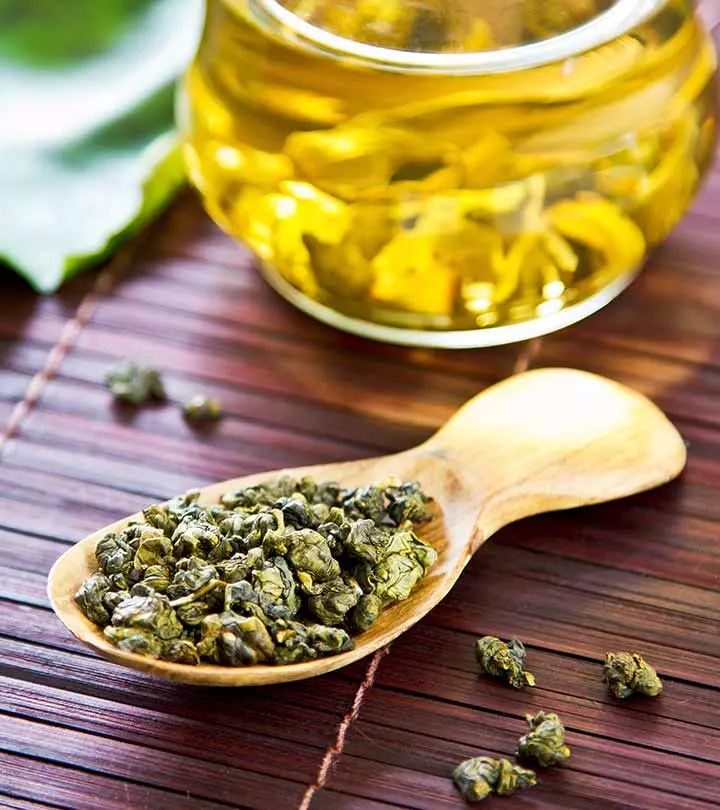
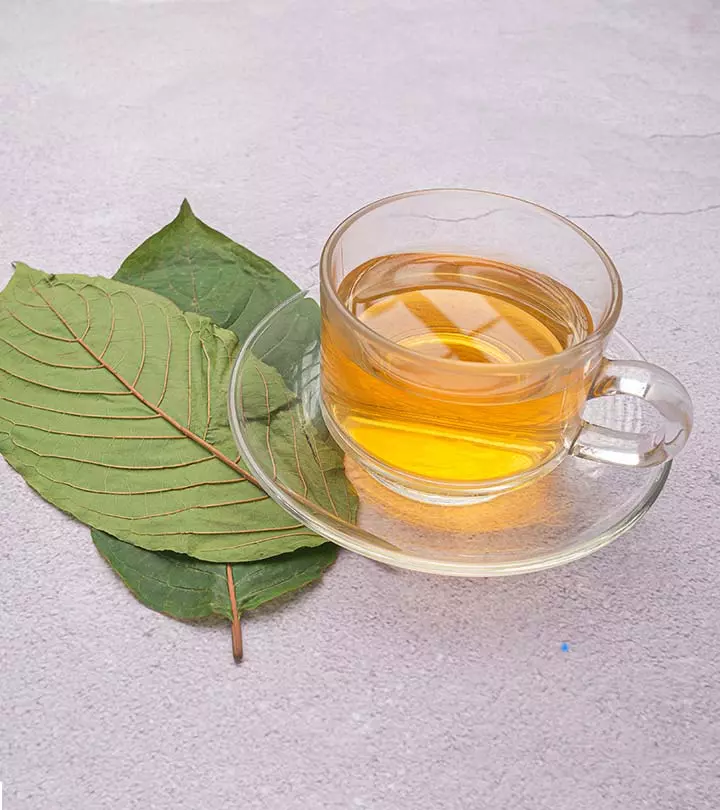
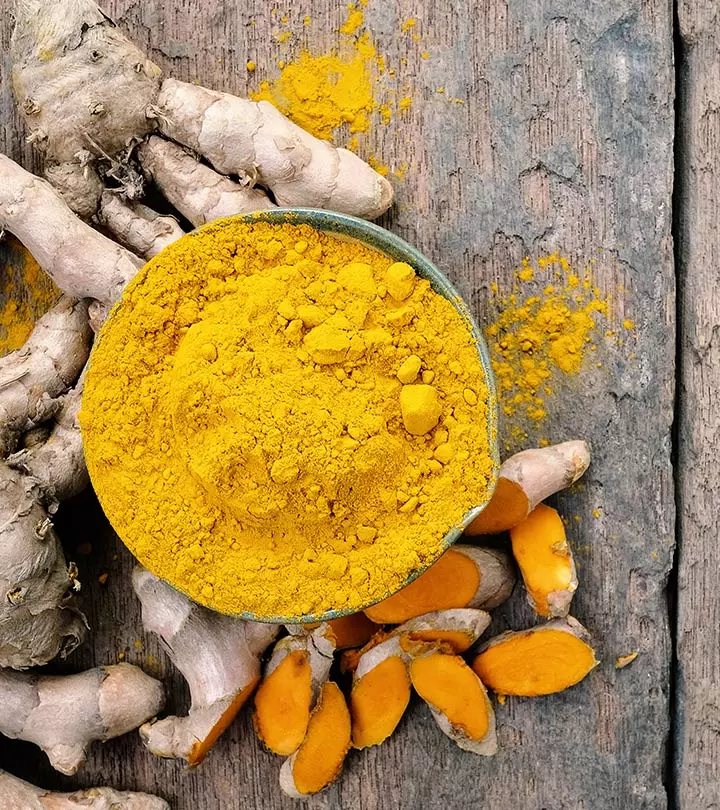
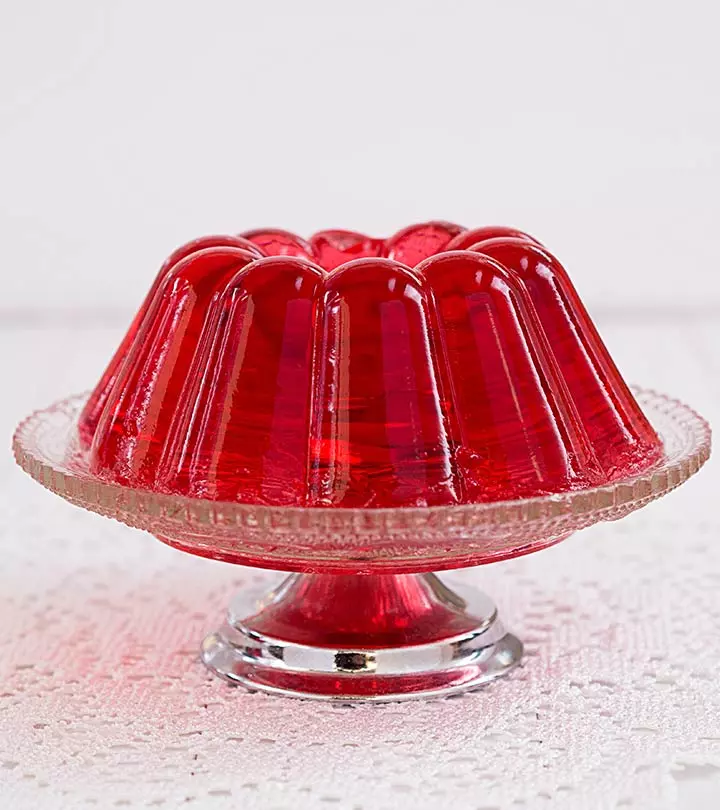
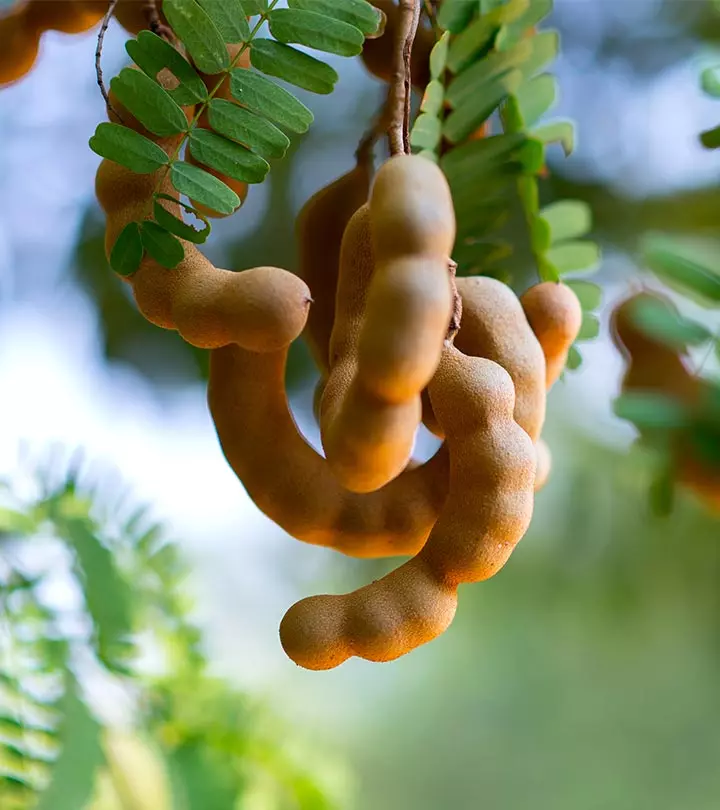
Community Experiences
Join the conversation and become a part of our empowering community! Share your stories, experiences, and insights to connect with other beauty, lifestyle, and health enthusiasts.